牛津沪教版英语六年级上6A-Unit1
- 格式:doc
- 大小:24.44 KB
- 文档页数:6
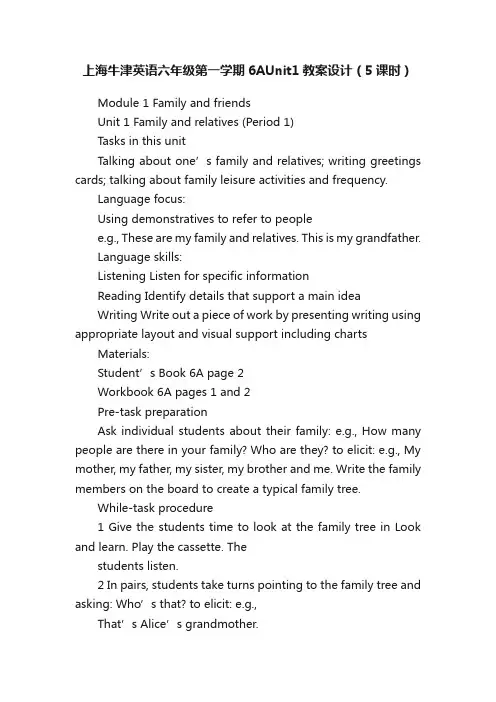
上海牛津英语六年级第一学期6AUnit1教案设计(5课时)Module 1 Family and friendsUnit 1 Family and relatives (Period 1)Tasks in this unitTalking about one’s family and relatives; writing greetings cards; talking about family leisure activities and frequency.Language focus:Using demonstratives to refer to peoplee.g., These are my family and relatives. This is my grandfather.Language skills:Listening Listen for specific informationReading Identify details that support a main ideaWriting Write out a piece of work by presenting writing using appropriate layout and visual support including charts Materials:Student’s Book 6A page 2Workbook 6A pages 1 and 2Pre-task preparationAsk individual students about their family: e.g., How many people are there in your family? Who are they? to elicit: e.g., My mother, my father, my sister, my brother and me. Write the family members on the board to create a typical family tree.While-task procedure1 Give the students time to look at the family tree in Look and learn. Play the cassette. Thestudents listen.2 In pairs, students take turns pointing to the family tree and asking: Who’s that? to elicit: e.g.,That’s Alice’s grandmother.3 Give the students time to look at the pictures in Look and read. Play the cassette. Thestudents repeat.4 Select two students to read the first dialogue. Then ask each of them: Who are you? to elicit:I’m their son/daughter.5 Select three pairs of students to read the second dialogue. Then ask the pairs: Who are you?to elicit: We’re their sons/grandsons/granddaughters.ConsolidationWorkbook 6A pages 1 and 2教后感:开学的第一节课,学生很有热情,但反映出的问题也很多。
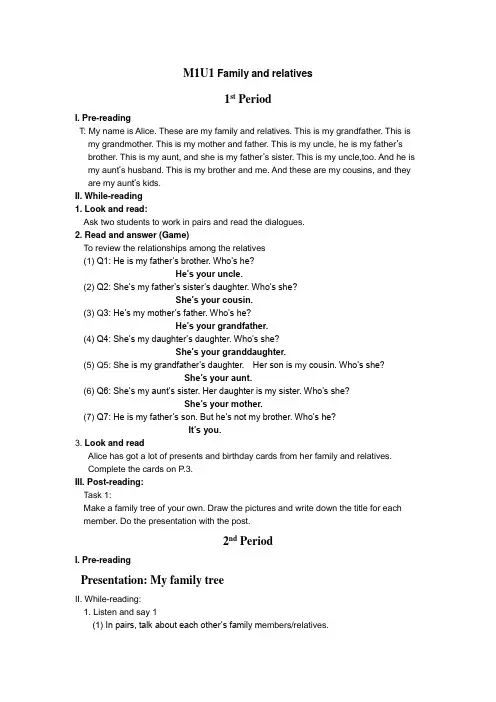
M1U1 Family and relatives1st PeriodI. Pre-readingT: My name is Alice. These are my family and relatives. This is my grandfather. This is my grandmother. This is my mother and father. This is my uncle, he is my father’s brother. This is my aunt, and she is my father’s sister. This is my uncle,too. And he is my aunt’s husband. This is my brother and me. And these are my cousins, and they are my aun t’s kids.II. While-reading1. Look and read:Ask two students to work in pairs and read the dialogues.2. Read and answer (Game)To review the relationships among the relatives(1) Q1: He is my father’s brother. Who’s he?He’s your uncle.(2) Q2: She’s my father’s sister’s daughter.Who’s she?She’s your cousin.(3) Q3: He’s my mother’s father. Who’s he?He’s your grandfather.(4) Q4: She’s my daughter’s daughter. Who’s she?She’s your granddaughter.(5) Q5: S he is my grandfather’s daughter. Her son is my cousin. Who’s she?She’s your aunt.(6) Q6: She’s my aunt’s sister. Her daughter is my sister. Who’s she?She’s your mother.(7) Q7: He is my father’s son. But he’s not my brother. Who’s he?It’s you.3. Look and readAlice has got a lot of presents and birthday cards from her family and relatives.Complete the cards on P.3.III. Post-reading:Task 1:Make a family tree of your own. Draw the pictures and write down the title for each member. Do the presentation with the post.2nd PeriodI. Pre-readingPresentation: My family treeII. While-reading:1. Listen and say 1(1) In pairs, talk about each other’s family m embers/relatives.e.g. S1: This is my ________.These areS2: How many ________ do you have?S1: I only have one ______./ I have ________.(2) Do the survey and complete the table. Then give us the report.I’ve just done the survey about family members/relatives. Here is the result. Ihave… brother(s) and my classmate has….brother(s).2. Listen and say 2What do you do with your family and relatives? Talk to a classmate, like this:e.g. S1: What do you do with your_____?S2: I alwaysusually __________ with my ________.sometimesS1: What else do you do with _______?S2: I sometimes … with _______.III. Post-readingTask 2: Writing: My familyThese are my family and relatives. This is ..... These are..... I always ....with (I)usually …with… I sometimes … with….IV. Words & expressions1. 家人和亲戚family and relatives2. 家谱a family tree3. 孙子和孙女们/外孙和外孙女们grandsons and granddaughters4. 从……得到许多礼物和生日贺卡get a lot of presents and birthday cards from…5. 生日快乐!Happy birthday (to sb.)!6.做一张生日贺卡make a birthday card7. 你的家庭成员之一one of your family members8. 谈论各自的家庭成员talk about each other’s family members9. 填表complete the table10. 你有多少叔叔/阿姨?How many uncles/aunts do you have?11. 我只有一个表(堂)兄妹I only have one cousin.12. 去购物go shopping13. 去游泳go swimming14. 去骑车go cycling15. 去饭店go to a restaurant16. 去公园go to the park17. 你和她还做了什么吗?what else do you do with her?18. 打羽毛球play badminton19. 打游戏play games20. 踢足球play football21. 看电影watch a film / watch films22. 我有时和他们一起看电视。
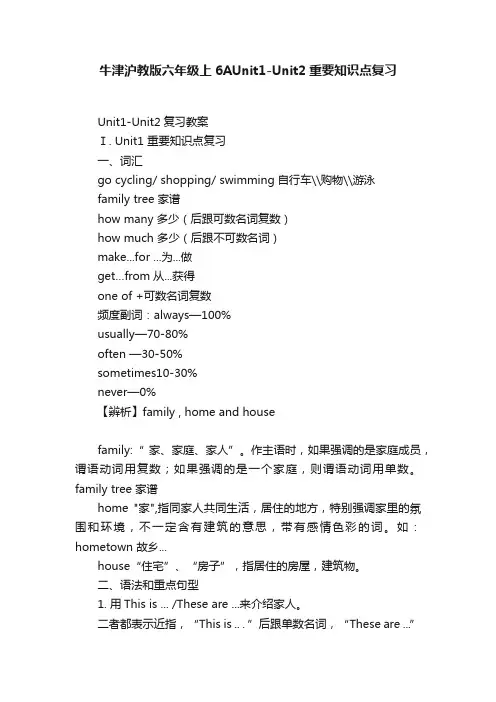
牛津沪教版六年级上6AUnit1-Unit2重要知识点复习Unit1-Unit2复习教案Ⅰ. Unit1 重要知识点复习一、词汇go cycling/ shopping/ swimming自行车\\购物\\游泳family tree 家谱how many 多少(后跟可数名词复数)how much 多少(后跟不可数名词)make...for ...为...做get…from从...获得one of +可数名词复数频度副词:always—100%usually—70-80%often —30-50%sometimes10-30%never—0%【辨析】family , home and housefamily:“ 家、家庭、家人”。
作主语时,如果强调的是家庭成员,谓语动词用复数;如果强调的是一个家庭,则谓语动词用单数。
family tree 家谱home "家",指同家人共同生活,居住的地方,特别强调家里的氛围和环境,不一定含有建筑的意思,带有感情色彩的词。
如:hometown 故乡...house“住宅”、“房子”,指居住的房屋,建筑物。
二、语法和重点句型1. 用This is ... /These are ...来介绍家人。
二者都表示近指,“This is .. . ”后跟单数名词,“These are ...”后跟复数名词或者多个不同的对象。
2.用how many 来询问数量后接可数名词的复数形式,当我们提问你有多少……时候,如果How many后跟人,常用how many... do you have?如果How many 后跟物,常用how many...have you got?3.What do you do with your... ? 和What else do you do with your... ? 来提问与家庭成员或亲戚一起做什么.else 意为别的其他的,常用于特殊疑问词或不定式之后,如what else, something else等。
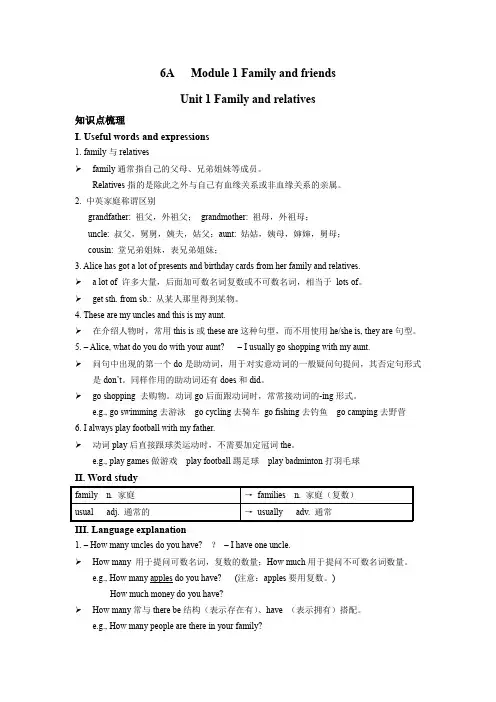
6A Module 1 Family and friendsUnit 1 Family and relatives知识点梳理I. Useful words and expressions1. family与relativesfamily通常指自己的父母、兄弟姐妹等成员。
Relatives指的是除此之外与自己有血缘关系或非血缘关系的亲属。
2. 中英家庭称谓区别grandfather: 祖父,外祖父;grandmother: 祖母,外祖母;uncle: 叔父,舅舅,姨夫,姑父;aunt: 姑姑,姨母,婶婶,舅母;cousin: 堂兄弟姐妹,表兄弟姐妹;3. Alice has got a lot of presents and birthday cards from her family and relatives.a lot of 许多大量,后面加可数名词复数或不可数名词,相当于lots of。
get sth. from sb.: 从某人那里得到某物。
4. These are my uncles and this is my aunt.在介绍人物时,常用this is或these are这种句型,而不用使用he/she is, they are句型。
5. – Alice, what do you do with your aunt? – I usually go shopping with my aunt.问句中出现的第一个do是助动词,用于对实意动词的一般疑问句提问,其否定句形式是don’t。
同样作用的助动词还有does和did。
go shopping 去购物。
动词go后面跟动词时,常常接动词的-ing形式。
e.g., go swimming去游泳go cycling去骑车go fishing去钓鱼go camping去野营6. I always play football with my father.动词play后直接跟球类运动时,不需要加定冠词the。
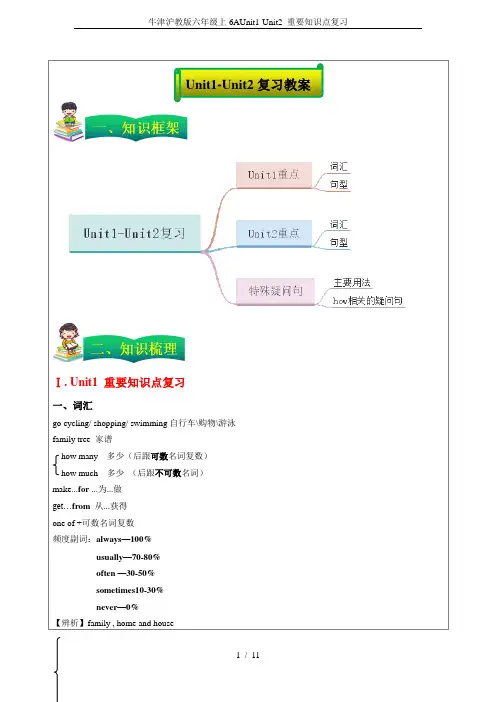
Unit1-Unit2复习教案Ⅰ. Unit1 重要知识点复习一、词汇go cycling/ shopping/ swimming自行车\购物\游泳family tree 家谱how many 多少(后跟可数名词复数)how much 多少(后跟不可数名词)make...for ...为...做get…from从...获得one of +可数名词复数频度副词:always—100%usually—70-80%often —30-50%sometimes10-30%never—0%【辨析】family , home and housefamily:“ 家、家庭、家人”。
作主语时,如果强调的是家庭成员,谓语动词用复数;如果强调的是一个家庭,则谓语动词用单数。
family tree 家谱home "家",指同家人共同生活,居住的地方,特别强调家里的氛围和环境,不一定含有建筑的意思,带有感情色彩的词。
如:hometown 故乡...house“住宅”、“房子”,指居住的房屋,建筑物。
二、语法和重点句型1. 用This is ... /These are ...来介绍家人。
二者都表示近指,“This is .. . ”后跟单数名词,“These are ...” 后跟复数名词或者多个不同的对象。
2.用how many 来询问数量后接可数名词的复数形式,当我们提问你有多少……时候,如果How many后跟人,常用how many... do you have?如果How many 后跟物,常用how many...have you got?3.What do you do with your... ? 和What else do you do with your... ? 来提问与家庭成员或亲戚一起做什么.else 意为别的其他的,常用于特殊疑问词或不定式之后,如what else, something else等。
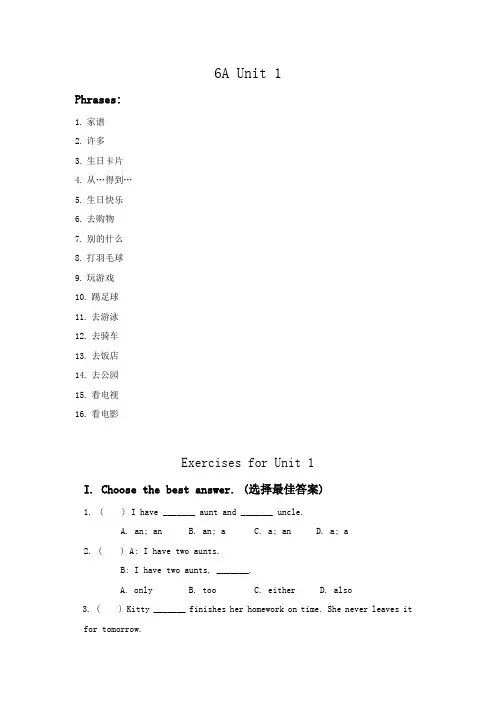
6A Unit 1Phrases:1.家谱2.许多3.生日卡片4.从…得到…5.生日快乐6.去购物7.别的什么8.打羽毛球9.玩游戏10.踢足球11.去游泳12.去骑车13.去饭店14.去公园15.看电视16.看电影Exercises for Unit 1I. Choose the best answer. (选择最佳答案)1.( ) I have _______ aunt and _______ uncle.A. an; anB. an; aC. a; anD. a; a2. ( ) A: I have two aunts.B: I have two aunts, _______.A. onlyB. tooC. eitherD. also3. ( ) Kitty _______ finishes her homework on time. She never leaves it for tomorrow.A. neverB. alwaysC. sometimesD. usually4. ( ) Tom has got a lot of Christmas cards _______ his good friends.A. withB. byC. fromD. at5. ( ) Mary usually _______ her homework after dinner.A. doB. doesC. writeD. writes6. ( ) Danny usually goes fishing with _______ uncle.A. heB. hisC. he’sD. him7. ( ) Joe is my father’s brother. He is my _______.A. cousinB. auntC. brotherD. uncle8. ( ) Do you want to make a kite _______ your sister?A. onB. toC. forD. at9. ( ) What _______ do you usually do at weekends?A. otherB. elseC. alsoD. too10. ( ) I usually go to the restaurant _______ my good friend.A. withB. aboutC. toD. at11. ( ) How many uncles _______ Mary _______?A. is… thereB. are… thereC. has…gotD. have…got12. ( ) Alice, _______ my new friend Bill.A. he isB. she isC. that isD. this is13. ( ) A: what do you often help your mother do?B: I often _______.A. go to the cinemaB. watch TVC. wash the dishesD. walk in the park14. ( ) How much _______ do you want, Kitty?A. eggsB. booksC. milkD. cakes15. ( ) On Sundays, Susan likes to _______ with her cousin.A. going shoppingB. shoppingC. go to shoppingD. go shoppingII. Complete the sentences with the given words in their proper forms.(用所给单词的适当形式填空)1.The students are planning to interview __________ (they) parents.2.I usually go __________ (swim) with my mum.3.The two ___________ (family) from Canada will visit Shanghai next week.4.Does Mr. Smith come to China for the ________ (one) time?5.What else do you do with ________ (he)?6.Alice has got a lot of birthday ________ (card) from her family and relatives.III. Rewrite the following sentences.(按要求改写句子)1.I sometimes play badminton with my brother. (改为否定句)I ________ _______ badminton with my brother.2.I have three aunts .(划线提问)________ _________ aunts do you have?3.This is my cousin.(改为复数)_________ _________ my __________.4.My family is big. Your family is bigger.(用than连成一句)Your family is _______ _______ my family.5.I usually go cycling with my father.(划线提问)________ do you usually ________ with your father?6.She always watches TV after dinner.(一般疑问句)________ she always ________ TV after dinner?V. Find the word which has the same sound to the word given.(选出与划线部分发音相同的选项)( ) 1. relative A. she B. cinema C. red D. people( ) 2. cycle A. yes B. cry C. sorry D. baby( ) 3. badminton A. cake B. family C. car D. father( ) 4. cousin A. south B. house C. loud D. young( ) 5. shop A. nose B. cold C. stop D. colourVI. Choose the right word to complete the sentences.(选择适当的词填空)1.Alice and her sister ______________ (has, have) got a very big bedroom.2.Do you have ______________ (some, any) questions to ask?3.She is very helpful. She likes to help ______________ (other, others).4.Kitty likes to show us a photo ______________ (with, of) he family andrelatives.5.My grandparents can play ______________ (/, the) basketball in theafternoon.VII. Fill in the blanks with the proper forms of the given verbs.(用所给动词的适当形式填空)1.Mr. Smith sometimes ______________ (go) to the cinema with his wife.2.The little girl can’t ____________ (run) fast.3.My parents never ____________ (dance) together.4.Alice ____________ (not be) from the USA.5.Mary likes ___________ (run) in the morning.6.It often __________ (rain) in Shanghai in spring.7.Kitty _________ (have) got a very nice bedroom.8._________ you usually __________ (watch) TV with your family?Reading and WritingⅠ.Read the passage and fill in the blanks with proper words.(在短文的空格内填入适当的词,使其内容通顺,每空格限填一词,首字母已给)My family is a big one. There are eleven p_______ in my family. My grandfather and g________ are both teachers. My father is a doctor. My mother is a nurse. They work hard. I o_______ have one aunt. Her name is Sue. She has a d_________.My c_______ and I are students.My name is Alice. I study a_____ No.3 Middle School. I like drawing. I u________ go shopping with my a_______ and sometimes play b_________ with her, too. I love my family m_________.Ⅱ.Choose the words or ex pressions and complete the passage.(选择最恰当的单词,完成短文)Mr. Brown __1__ a big garden. There are ___2___ trees and flowers in it. The flowers are very __3__. Some flowers are red, some flowers are yellow. He loves the garden __4__ much. His ___5___ often play near it. His two daughters __6__kites and his four sons play football. What a big family he has! And __7__ happy they are!( ) 1. A. have B. has C. had D. have not( ) 2. A. much B. any C. many D. a lot( ) 3. A. too beautiful B. much beautifulC. beautifulD. beautifully( ) 4. A. too B. more C. very D. a lot( ) 5. A. children B. child C. brother D. wife( ) 6. A. fly B. flys C. are flying D. flies( ) 7. A. what B. what a C. how a D. howⅢ. Answer the questions according to the passage.(根据文章内容回答问题)Most English people have three names: a first name, a middle name and the family name. Their family name comes last. For example, my full name is Jim Allan Green. Green is my family name. My parents gave me both of my other names.People don’t use their middle names very much. So “John Henry Brown” is usually called “John Brown”. People never use Mr., Mrs. or Miss before their first names. So you can say John Brown, or Mr. Brown; but you should never say Mr. John. They use Mr., Mrs. or Miss with the family name but never with the first name.Sometimes people ask me about my name. “When you were born, why did your parents call you Jim?” they ask.” Why did they choose that name?” The answer is they didn’t call Jim. They called me James. James was the name of my grandfather. In England, people usually call me Jim for short. That’s because it is shorter and easier than James.1.How many names do most English people have?______________________________________2.What is Jim’s family name?______________________________________3.What do English people use Mr., Mrs. or Miss with?______________________________________4.Why do people usually call the writer Jim instead of James?______________________________________5.What’s your English name?______________________________________Ⅳ. Write at least 60 words about the topic “I have a happy family”(就“我有一个幸福的家庭”为题,写至少5句话)Suggested outlines:(文章必须包含下列要点)1.What’s your family like?2.Tell something about your family and relatives.3.Do you like your family? Why?KeyI. Choose the best answer.1-5 ABBCB 6-10 BDCBA 11-15 CDCCDII. Complete the sentences with the given words in their proper forms:their swimming families first him cardsIII. Rewrite the following sentences:1. never/don’t play2.how many3.these are …cousins4.bigger than5.W hat …do6.D oes… watchIV. Write out the words according to the sounds:1.only2.grandson3.relative4.else5.cycle6.granddaughterV. Find the word which has the same sound to the word given1. C2. B3.B4.D5.CVI. Choose the right word to complete the sentences.1. have2. any3.others4.of5./VII. Fill in the blanks with the proper forms of the given verbs.1. goes2. run3. dance4. isn’t5. running6. rains7. has8. Do…watchReading and WritingⅠ.Read the passage and fill in the blanks with proper words1.people2.grandmother3.only4.daughter5.cousin(s)6.atually8.aunt9.badminton/basketball 10.membersⅡ.Choose the words or expressions and complete the passage1. B2. C3.C4.C5.A6.A7. DⅢ. Answer the questions according to the passage1. Three2. Green3. the family name4. Because it is shorter and easier than James.。
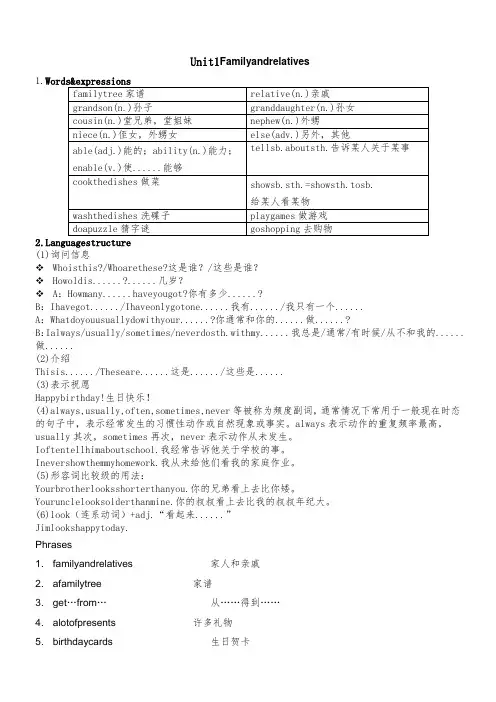
Unit1Familyandrelatives1.(1)❖❖❖AB:A:B:......做(2)(3)(5)(6)look(连系动词)+adj.“看起来......”Jimlookshappytoday.Phrases1. familyandrelatives 家人和亲戚2. afamilytree 家谱3. get…from…从……得到……4. alotofpresents 许多礼物5. birthdaycards 生日贺卡6. happybirthday 生日快乐7. makeabirthdaycardforme. 为我做一张生日贺卡8. oneofyourfamilymembers 你的家庭成员之一9. talkabout 谈论10. goshopping 去购物11. goswimming 去游泳12. gocycling 去骑车5.Let saysomethingabout toyoufirst.(I)6.Iliketogo (shop)withmumandshealwaysbuyssomethingforme.7.Sheisalways (friend)tootherpeople.8.TheSmithsaregoingtovisit (they)friendsinAmerica.9.Therearetwelve (member)inmyfamily.10.Iusuallygototheparkwith (I)parents.11. (this)aremyfamilyphotos,canyoufindme?12.Iusuallygo (swim)insummer.13.Howmany (classmate)arethereinyourclass?14.Bytheway,whatelsedoyoudowith (they)?15.Thisis (Tom)classmate.II.Choosetherightwordsorexpressionstocompletethesentences.(选择适当的单词或短语完成句子)1.I gotoschoolat7:30.10.Weusewatertowashclothes,we (both,also)usewatertocookfoodandmakedrinks.11.SamisAlice’suncle.SoAliceisSam’s (nephew,niece).12. (These,This)aremycousins.IV.Choosethebestanswer.(选择最恰当的答案)()1.Ihavegotalotofbirthdaycards myfamilyandrelatives.A.atB.forC.inD.from()2.Mr.andMrs.Wangaremyparents.Iamtheir .A.sisterB.doctorC.cousinD.daughter()3.–Happybirthdaytoyou!-- .A.ThankyouB.HowareyouC.That’sallrightD.Fine,thankyou()4.Tomsometimes withhisbestfriend,Peter.A.toplaybadmintonB.playsbadmintonC.playingbadmintonD.playbadmintons()5.Theyaremygrandparents.Iam grandson.()()()()()()()()()14. averycoldmorning,theboywasborninapoorfamily.A.InB.OnC.AtD.Under()15.Mygrandfatheris inmyfamily.A.olderB.oldestC.oldD.theoldest ()16.Thisisafriendof .A.theyB.themC.theirsD.their()17. wonderfulpicture!Ilikeitverymuch.A.WhataB.WhatC.HowD.Howa()18.Ihaveonecousin.Shehasonecousin, .A.alsoB.tooC.bothD.either()19.Mariaoftengoesshopping hermother.A.forB.withC.fromD.of()20.What doyouusuallydoonSunday?A.elseB.othersC.anotherD.theother()()()()()()()()()29.Peteralways lunchatschool.Buttomorrowhe athome.A.has;isgoingtohaveB.have;wasgoingtohaveC.has;wasgoingtohaveD.have;isgoingtohave()30.Look!Thesearemy and .A.family;relativeB.family;relativesC.families;relativesD.families;relative ()31.JimandPeterare aboutDanny’sbirthday.A.sayingB.speakingC.talkingD.telling()32.Whatan gameitis!A.exciteB.excitingC.excitedD.excitedly()33.Ienjoyplayingfootballwithmyfatheratweekends.Theunderlinedwordmeans“”.A.wantB.wouldlikeC.likeD.liketo()34.Mygrandfatheralwaystakeawalkafterdinner.Theunderlinedwordmeans“”.A.alreadyB.allthetimeuallyD.sometimes()35.–Thankyouforhelpingme.It’sveryniceofyou.–.14.Mytelephonenumberis.(对划线部分提问)15.Isometimesplaybadmintonwithmyfather.(改为一般疑问句)16.MaryandLucyaremybestfriends.(改为一般疑问句)VI.Choosethewordorexpressionwhichisclosestinmeaningtotheunderlinedpartineachsentences (选择与下列各句中划线部分内容意思接近的单词或短语)1.June28th isAmy’sbirthday.2.Didyouhaveagoodtimeonyoursummerholiday?3.Wouldyoushowmeyourstamps?4.Thepeopleinthatroomaremyauntsanduncles.5.ThissummerholidayLucyisgoingtovisithergrandparentsinChongming. VII.Fillintheblankswiththeverbsintheirproperforms(时态填空)1.Johnnever (do)thecookingathome.2.They (noteat)thetraditionalfoodinChina.3.do,your,you,do,with,youruncle,what,usually。
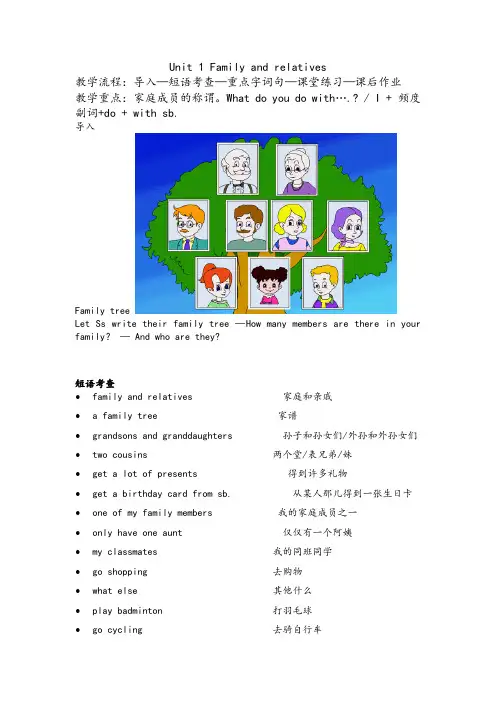
Unit 1 Family and relatives教学流程:导入—短语考查—重点字词句—课堂练习—课后作业教学重点:家庭成员的称谓。
What do you do with….? / I + 频度副词+do + with sb.导入Family treeLet Ss write their family tree —How many members are there in your family?— And who are they?短语考查•family and relatives 家庭和亲戚• a family tree 家谱•grandsons and granddaughters 孙子和孙女们/外孙和外孙女们•two cousins 两个堂/表兄弟/妹•get a lot of presents 得到许多礼物•get a birthday card from sb. 从某人那儿得到一张生日卡•one of my family members 我的家庭成员之一•only have one aunt 仅仅有一个阿姨•my classmates 我的同班同学•go shopping 去购物•what else 其他什么•play badminton 打羽毛球•go cycling 去骑自行车•go swimming 去游泳•how many + 名词复数多少……重点字词句1. relative 亲属,亲戚【解析】These are my family and relatives. 这些是我的家人和亲属。
【家人及亲属称谓】Grandfather 爷爷;外公 grandmother 奶奶;外婆Uncle 叔叔;舅舅 aunt 阿姨;婶婶Cousin 堂(表)兄弟姐妹【考点】parents 表示父母双亲; parent 表示父母中的一方,父亲或母亲2. cycle 骑自行车【解析】 I can’t cycle to school today because my bicycle is broken. 我今天不能骑车去上学了,因为我的自行车坏了。
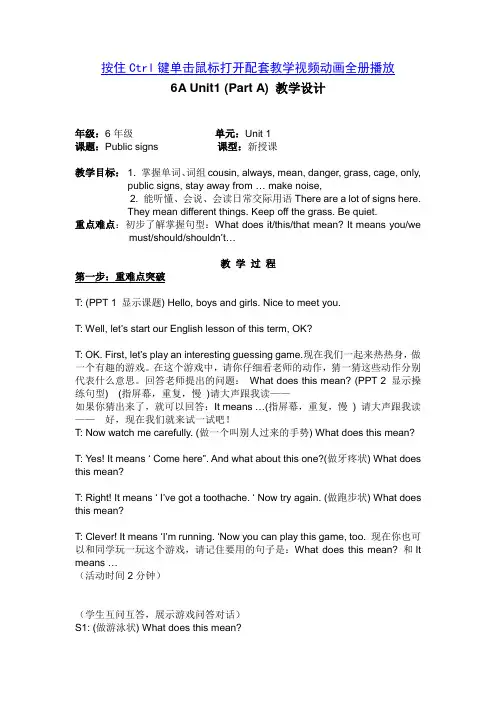
按住Ctrl键单击鼠标打开配套教学视频动画全册播放6A Unit1 (Part A) 教学设计年级:6年级单元:Unit 1课题:Public signs 课型:新授课教学目标: 1. 掌握单词、词组cousin, always, mean, danger, grass, cage, only, public signs, stay away from … make noise,2. 能听懂、会说、会读日常交际用语There are a lot of signs here.They mean different things. Keep off the grass. Be quiet.重点难点:初步了解掌握句型:What does it/this/that mean? It means you/we must/should/shouldn’t…教学过程第一步:重难点突破T: (PPT 1 显示课题) Hello, boys and girls. Nice to meet you.T: Well, let’s start our English lesson of this term, OK?T: OK. First, let’s play an interesting guessing game.现在我们一起来热热身,做一个有趣的游戏。
在这个游戏中,请你仔细看老师的动作,猜一猜这些动作分别代表什么意思。
回答老师提出的问题:What does this mean? (PPT 2 显示操练句型) (指屏幕,重复,慢)请大声跟我读——如果你猜出来了,就可以回答:It means …(指屏幕,重复,慢) 请大声跟我读——好,现在我们就来试一试吧!T: Now watch me carefully. (做一个叫别人过来的手势) What does this mean?T: Yes! It means ‘ Come here”. And what about this one?(做牙疼状) What does this mean?T: Right! It means ‘ I’ve got a toothache. ‘ Now try again. (做跑步状) What does this mean?T: Clever! It means ‘I’m running. ‘Now you can play this game, too. 现在你也可以和同学玩一玩这个游戏,请记住要用的句子是:What does this mean? 和It means …(活动时间2分钟)(学生互问互答,展示游戏问答对话)S1: (做游泳状) What does this mean?S2: It means ’swim ”.S1: (做快速游泳状) What does this mean?S2: It means ’swim fast ”.S3: (做停止手势) What does this mean?S4: It means ’Stop ”.S4: (竖起大拇指) What does this mean?S3: It means ’Great ”.T: They did a good job. What about you? 你呢?(本步骤设计说明:本节课课文对话生词较多,对话中反复出现新句型What does it mean? It means … 学生感觉比较陌生,在理解时会产生困难。
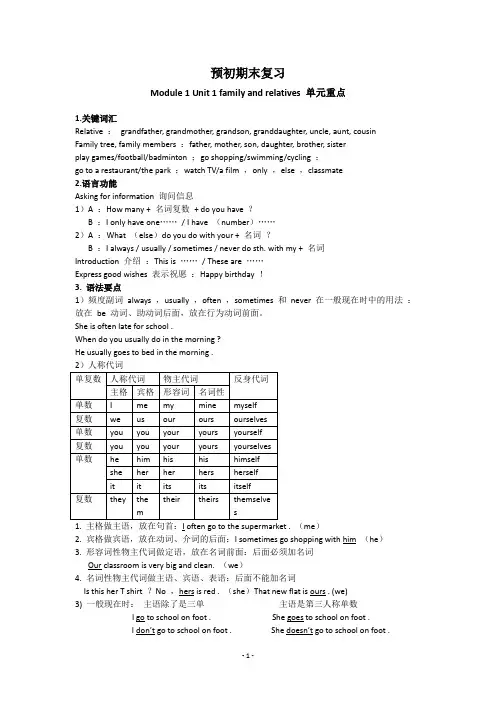
预初期末复习Module 1 Unit 1 family and relatives 单元重点1.关键词汇Relative :grandfather, grandmother, grandson, granddaughter, uncle, aunt, cousinFamily tree, family members :father, mother, son, daughter, brother, sisterplay games/football/badminton ;go shopping/swimming/cycling ;go to a restaurant/the park ;watch TV/a film ,only ,else ,classmate2.语言功能Asking for information 询问信息1)A :How many + 名词复数+ do you have ?B :I only have one……/ I have (number)……2)A :What (else)do you do with your + 名词?B :I always / usually / sometimes / never do sth. with my + 名词Introduction 介绍:This is ……/ These are ……Express good wishes 表示祝愿:Happy birthday !3. 语法要点1)频度副词always ,usually ,often ,sometimes 和never 在一般现在时中的用法:放在be 动词、助动词后面,放在行为动词前面。
She is often late for school .When do you usually do in the morning ?He usually goes to bed in the morning .1. 主格做主语,放在句首:I often go to the supermarket . (me)2. 宾格做宾语,放在动词、介词的后面:I sometimes go shopping with him (he)3. 形容词性物主代词做定语,放在名词前面:后面必须加名词Our classroom is very big and clean. (we)4. 名词性物主代词做主语、宾语、表语:后面不能加名词Is this her T shirt ?No ,hers is red . (she)That new flat is ours . (we)3) 一般现在时:主语除了是三单主语是第三人称单数I go to school on foot . She goes to school on foot .I don’t go to school on foot . She doesn’t go to school on foot .Do you go to school on foot ?Does she go to school on foot ?Yes ,I do . / No ,I don’t Yes she does . / No ,she doesn’t动词变化①以s ,x ,ch ,sh ,o结尾+es ;②以辅音字母+y结尾,去y+ies ;③have…hasModule 1 Unit 2 I have a good friend 单元重点1.关键词汇词性转换:friend n. ……friendly a. ……friendship n.help n. v. ……helpful a. ……helpless a.kind a. ……kindness n. ……kindly ad.pollute v. ……pollution n.discuss v. ……discussion n.use v. ……reuse v. ……useful a. ……useless a.angry a. ……angrily ad. ……anger n.visit n. v. ……visitor n.词组:talk to/with sb talk about sth = discuss sthlike to do/doing enjoy doingevery day every night/morning/afternoongo out at night walk to school = go to school on footbe together play togethereat one’s lunch share one’s foodhelp each other each other = one anotherhelp other people other people = othersbe late for ask sb about sthwork hard be kind toget angry get coldshare sth with sb tell lieslive in the USA visit Garden Cityfor the first time on Saturdaya friend of the Earth pick up rubbishlook after = take care of = care for all the things around uspollute the environment air/land/water/noise pollutionkeep ……clean keep + adj; keep quiteput rubbish into rubbish bins leave rubbishtell sb to do ; tell sb not to do ask , invite , allow , want sb not to dowant to be want/agree/decide/hope/offer/try/manage + to do promise to do ; promise not to do discuss sth with sb2.语言功能1)A :Thank you! B :Not at all./ You’re welcome./ It’s a pleasure./ That’s all right.2) A :We want to look after the environment . B :All right .3.语法要点1)We like to + v ……together2)be + adj :She is always naughty/clever/friendly/helpfui比较:She always gets angry . She never tells lies.3) A:Where have you been ? B:I have been to ……A:Have you been to ___________yet?B: yes, I have just /already been to ______./Y es , I have just /already been there.No, I haven’t been to ______yet. / no, I haven’t been there yet.4) we promise to .../we promise not to ..Module 1 unit3 spending a day out together1. 关键词汇词性转换happy a.------- happily ad. -------unhappy a.sand n. ---------sandy a.sun n. -------sunny a.cloud n.-------- cloudy a. wind n. ------windy a.rain n. ------rainy a. snow n. ------snowy a.luck n. ------lucky a. ------luckily ad. ------ unlucky a.act v. ------activity n. ------ actor n. ------ actress n. ------action n.collect v. ------ collection n.important a. ------importance n.special a. ------specially ad.词组:At weekends= at the weekend on weekdaysBe far away from be nearIn sandy bay/ sunny town on lucky islandCome with sb space museumA photo of me the students of class threeBuy tickets eat ice creamHave a barbecue/a picnic/lunch/dinner spend a holidayFly tickets ride bicycles= cycleMake sandcastle collect shellsMake an album come backPlan a visit plan to do sthCome back make some notesGet there get to ShanghaiMy sixtieth birthday her ninth birthdayHave a big birthday party have a good time = enjoy oneselfPlay with sb get enough food for the party2. 语言功能1)A: Let’s go to Ocean Park . B : That’s a good idea./All right.2)A: Where have you been in -----? B: I have been to ----in---with sb3) A: Which place shall we visit? B: Shanghai MuseumWhen shall we go there ? On SaturdayWhat time ---? 9 o’clockHow are we going to get there ? By undergroundHow much does it cost? = How much is it ?How much do they cost ? = How much are they ?3. 语法要点1) 表示建议How about + n/doing? How about playing badminton?What about + n/doing? What about playing badminton?Why not + do ? Why not play badminton.Why don’t you + do? Why don’t you play badminton?Let’s + do . Let’s play badminton.2) 现在进行时表示说话正在发生的动作或目前这一阶段正在进行的动作’s nine.搭配Module 2 Unit 4 What would you like to be 单元重点1词性转换:secret a.-------secretary n .teach n.-------teacher n .drive n.-------driver n .work v .------worker n .safe n .a.-----safely ad.------safety a.fire n.-------fireman n.post .v.-----postman n. ----postage n-----poster ncook v.------cook n.-------cooker n.2词组:1.find out Please find out who broke the window .find At last he found his English book.look for Alice is looking for her new watch .2.interview sb interview her3.start work4.finish work5.put sth together6.stick sth on a display board7.in the morning/afternoon/eveningOn a cold morning on Sunday afternoon/on the evening of July 18.make our city a safe placemake sth for sb =make sb sth make a cake for us =make us a cakemake sb+adj. make me happy9.eight years old3.语言功能A.表达愿望(wishes)Would you like to be a policeman ?—Yes, I would./ No, I would not.B. 陈述原因(give reasons)Why……?Because……4.语法要点:A.I’d=I would ; would not =wouldn’tB. would like to 与want to 的转换I would like to be a nurse .=I want to be a nurse.I wouldn’t like to be a nurse.=I don’t want to be a nurse .Would you like to be a nurse ?=Do you want to be a nurse ?She would like to be a nurse.=She wants to be a nurse .She wouldn’t like to be a nurse.=She doesn’t want to be a nurse .Would she like to be a nurse?=Does she want to be a nurse ?5.职业A cook cooks food for people.A secretary takes notes and answers phones.A dentist looks after people’s teeth.A doctor makes sick people better.A nurse helps make sick people better.A pilot flies a plane.A shop assistant sells things to people.A factory worker makes things in a factory.A fireman puts out fires.A bank clerk receives money and gives money in a bank.Module 2 Unit 5 Open Day 单元重点1.词性转换:1. enter v.----------entrance n.2. music n. -------musical a.3.final a.--------finally ad.4.invite v.------invitation n.5.act v.--------activity n.6. different a.----difference n.2.词组:1.arrive at (小)in(大)+地点get to +地点到达某地Arrive at school arrive in Shanghai get to Shanghai reach Shanghai比较:arrive home/here/there get home reach home2.meet sb at +地点meet Mary at the entrance3.visit sb/sp. Visit Mr. Wang/visit Beijing4.look at sb/sth look at class project/look at me5.listen to sb/sth listen to him /listen to the music6.the Arts and Crafts room English club noticeboard7.in the library in the hall in the music room in classroom 6A8.have tea and cakes9.want sb to do sth want us to make notes10.welcome sb welcome the parents11.on the open day 12.in different places13.on the second floor 14.teachers’office15. invite sb to do sth invite Lily to have a picnic16.take some photos complete the article17. have a good time =have a great time =enjoy oneself=enjoy one’s time3.语言功能:A.询问信息(Asking for information)--When What time Where WhatWhere will kitty be? Kitty will be in the music room.B.用副词表达事情得进展顺利。
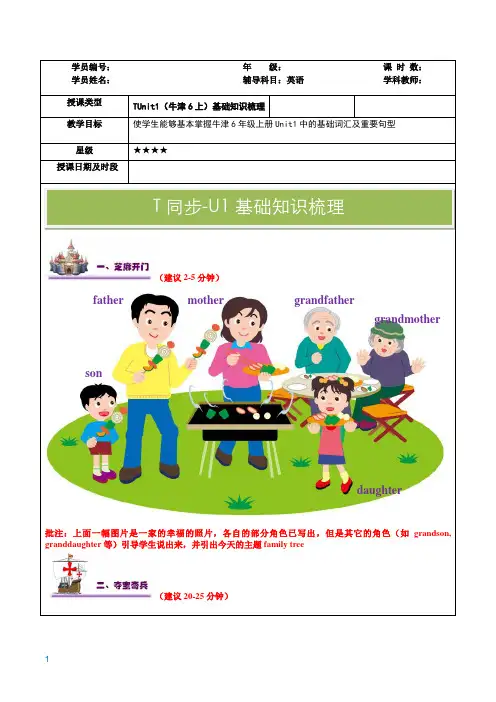
学员编号:年级:课时数:学员姓名:辅导科目:英语学科教师:授课类型TUnit1(牛津6上)基础知识梳理教学目标使学生能够基本掌握牛津6年级上册Unit1中的基础词汇及重要句型星级★★★★授课日期及时段T同步-U1基础知识梳理(建议2-5分钟)father mother grandfathergrandmother sondaughter批注:上面一幅图片是一家的幸福的照片,各自的部分角色已写出,但是其它的角色(如grandson, granddaughter等)引导学生说出来,并引出今天的主题family tree(建议20-25分钟)一、词汇与词组Words and words phrases1. 本单元中出现的主要家庭成员的称谓包括:1)表示和自己有直系血缘关系的:Father(父亲,爸爸)mother ( 母亲,妈妈) sister (姐姐,妹妹) brother (哥哥,弟弟)等以上称谓对于我来说都是家人,即my family members2) 表示和自己有或无血缘关系得:Grandfather(祖父,外祖父) grandmother(祖母,外祖母),grandson(孙子,外孙)granddaughter (孙女外孙女),uncle(叔叔,舅舅),aunt(姨父,姑父阿姨,姑妈,婶婶),cousin(堂表兄,堂表第,堂表姐堂表妹)2. play games 玩游戏;play footbal踢足球;play badminton(打羽毛球)【知识拓展】play 后跟球类运动时不加定冠词,但跟乐器时,乐器名称前要加定冠词theLet's play badminton together after school! 让我们放学后一起打羽毛球吧I usually play football with my father on Saturday. 周六我常和父亲一起踢足球I can play the piano. 我会弹钢琴Listen! Someone is playing the violin. 听有人在拉小提琴批注:play用法之前有学习过,所以这部分主要以学生为主导,教师引导讲解2) 3.go后面常跟动词的doing形式,表示去做某件事情【知识拓展】go shopping(去购物);go swimming(去游泳) ;go cycling(去骑车)go travelling(去旅游); go fishing (去钓鱼) go skating 去溜冰;go skiing 去滑雪My grandfather sometimes goes fishing on a warm afternoon. 在暖和的下午,我爷爷It's a fine day. Let's go cycling! 多好的天气呀" 让我们一起去骑车吧批注:知识拓展部分可由教师提问的方式由学生来回答4. go to a restaurant 去饭馆吃饭;go to the park去公园注意这几个固定搭配中的名词前要加适当的冠词,比如:go to the cinema去看电影go to the supermarket 去超市等My family usually go to the restaurant at the weekend. 周末我们家常去饭馆吃饭Mum, can I go to the supermarket with you? 妈妈,我能和你一起去超市吗?5. watch TV去看电视;watch a film(看电影) 此处,watch意思为观看,又如" watch 看卡通,动画片; watch carefully(仔细观察)I like watching cartoons very much. 我非常喜欢看卡通片The science teacher usually asks us to watch him carefully.科学老师常让我们仔细观察批注:这部分可以给学生进行4个看的用法回顾(see, look, read, watch)6.本单元出现了三个频度副词:always 总是,一直usually 经常,常常sometimes有时We should always help each other. 我们始终应互相帮助My father usually goes out for a walk after dinner.晚饭后我父亲经常出去散步She sometimes watches TV after homework. 做完作业后她有时候会看电视批注:还可以给学生巩固其它频度副词,并复习对频度副词用how often用法二、重要句型Important Sentences structures1. This is ... /These are ...来介绍家人。
一、重点词汇和短语:relative n.亲戚;亲属classmate n.同班同学family tree n.家谱granddaughter n. 孙女;外孙女grandson n. 孙子,外孙only adv.仅仅member n.成员;会员badminton n. 羽毛球shop v.购物else adv. 别的;其他的cycle v.骑自行车go shopping 去购物go cycling 去骑自行车talk about 谈论二、词汇精解:1.family tree(名词)家谱解析:family tree 是复合名词,意为“家谱”。
举例:Look!This is my family tree. 看!这是我的家谱。
2.talk about 谈论(某事或某人)解析:其中about是介词,其后接动词时,应用动词-ing形式;其后接人称代词时,应用宾格形式。
举例:They’re talking about her. 他们正在谈论她。
3.classmate(名词)同学解析:classmate = class(班级)+mate(伙伴)→班级里的伙伴→同学。
举例:Paul is my classmate. 保罗是我的同学。
拓展:schoolmate 校友;deskmate 同桌;playmate 玩伴4.go shopping 去购物解析:go shopping 意为“去购物”。
go + v. –ing大多表示休闲活动。
举例:go fishing 去钓鱼;go camping 去露营;go swimming 去游泳5.alawys (副词)总是解析:表示事情发生的频率,意为“总是”。
举例:I always go to school by bus. 我总是乘公共汽车去上学。
拓展:表示频率的词还有:usually 通常;often 经常;sometimes 有时;never 从不6.only(副词)仅仅解析:only常位于所修饰的动词、短语或从句前。
6A Unit 1Phrases:1. family tree 家谱2. a lot of 许多3. birthday card 生日卡片4. get⋯from⋯从⋯得到⋯5. happy birthday 生日快乐6. go shopping 去购物7. what else 别的什么8. play badminton 打羽毛球9. play games 玩游戏10. play football 踢足球11. go swimming 去游泳12. go cycling 去骑车13. go to a restaurant 去饭店14. go to the park 去公园15. watch TV 看电视16. watch a film 看电影Exercises for Unit 1I. Choose the best answer.选( 择最佳答案)1. ( ) I have _______ aunt and _______ uncle.A. an; anB. an; aC. a; anD. a; a2. ( ) A: I have two aunts.B: I have two aunts, _______.A. onlyB. tooC. eitherD. also3. ( ) Kitty _______ finishes her homework on time. She never leaves it for tomorrow.A. neverB. alwaysC. sometimesD. usually4. ( ) Tom has got a lot of Christmas cards _______ his good friends.A. withB. byC. fromD. at5. ( ) Mary usually _______ her homework after dinner.A. doB. doesC. writeD. writes6. ( ) Danny usually goes fishing with _______ uncle.A. heB. hisC. he’sD. him7. ( ) Joe is my father’s brother. He is my _______.A. cousinB. auntC. brotherD. uncle8. ( ) Do you want to make a kite _______ your sister?A. onB. toC. forD. at9. ( ) What _______ do you usually do at weekends?A. otherB. elseC. alsoD. too10. ( ) I usually go to the restaurant _______ my good friend.A. withB. aboutC. toD. at11. ( ) How many uncles _______ Mary _______?A. is ⋯thereB. are⋯thereC. has⋯gotD. have⋯got12. ( ) Alice, _______ my new friend Bill.A. he isB. she isC. that isD. this is13. ( ) A: what do you often help your mother do?B: I often _______.A. go to the cinemaB. watch TVC. wash the dishesD. walk in the park14. ( ) How much _______ do you want, Kitty?A. eggsB. booksC. milkD. cakes15. ( ) On Sundays, Susan likes to _______ with her cousin.A. going shoppingB. shoppingC. go to shoppingD. go shoppingII. Complete the sentences with the given words in their proper forms.(用所给单词的适当形式填空)1. The students are planning to interview __________ (they) parents.2. I usually go __________ (swim) with my mum.3. The two ___________ (family) from Canada will visit Shanghai next week.4. Does Mr. Smith come to China for the ________ (one) time?5. What else do you do with ________ (he)?6. Alice has got a lot of birthday ________ (card) from her family and relatives.III. Rewrite the following sentences. (按要求改写句子)1. I sometimes play badminton with my brother. ( 改为否定句)I ________ _______ badminton with my brother.2. I have three aunts .(划线提问)________ _________ aunts do you have?3. This is my cousin.( 改为复数)_________ _________ my __________.4. My family is big. Your family is bigger.( 用than 连成一句)Your family is _______ _______ my family.5. I usually go cycling with my father.( 划线提问)________ do you usually ________ with your father?6. She always watches TV after dinner.( 一般疑问句)________ she always ________ TV after dinner?IV. Write out the words according to the sounds.(根据音标写出单词)6%1. / / __________2./ / ____________3. / / __________4. / / _____________5. / / __________6. / ( ) / _____________V. Find the word which has the same sound to the word given. (选出与划线部分发音相同的选项)( ) 1. relative A . she B. cinema C. red D. people( ) 2. cycle A. yes B. cry C. sorry D. baby( ) 3. badminton A. cake B. family C. car D. father( ) 4. cousin A. south B. house C. loud D. young( ) 5. shop A. nose B. cold C. stop D. colourVI. Choose the right word to complete the sentences.(选择适当的词填空)1. Alice and her sister ______________ (has, have) got a very big bedroom.2. Do you have ______________ (some, any) questions to ask?3. She is very helpful. She likes to help ______________ (other, others).4. Kitty likes to show us a photo ______________ (with, of) he family and relatives.5. My grandparents can play ______________ (/, the) basketball in the afternoon.VII. Fill in the blanks with the proper forms of the given verbs. (用所给动词的适当形式填空)1. Mr. Smith sometimes ______________ (go) to the cinema with his wife.2. The little girl can ’t ____________ (run) fast.3. My parents never ____________ (dance) together.4. Alice ____________ (not be) from the USA.5. Mary likes ___________ (run) in the morning.6. It often __________ (rain) in Shanghai in spring.7. Kitty _________ (have) got a very nice bedroom.8. _________ you usually __________ (watch) TV with your family?Reading and WritingⅠ.Read the passage and fill in the blanks with proper words. (在短文的空格内填入适当的词,使其内容通顺,每空格限填一词,首字母已给)My family is a big one. There are eleven p_______ in my family. My grandfather and g________ are both teachers. My father is a doctor. My mother is a nurse. They work hard. I o_______ have one aunt. Her name is Sue. She has a d_________. My c_______ and I are students.My name is Alice. I study a_____ No.3 Middle School. I like drawing. I u________ go shopping with my a_______ and sometimes play b_________ with her, too. I love my family m_________.Ⅱ.Choose the words or expressions and complete the passage(. 选择最恰当的单词,完成短文)Mr. Brown __1__ a big garden. There are ___2___ trees and flowers in it. The flowers arevery __3__. Some flowers are red, some flowers are yellow. He loves the garden __4__ much.His ___5___ often play near it. His two daughters __6__kites and his four sons play football. What a big family he has! And __7__ happy they are!( ) 1. A. have B. has C. had D. have not( ) 2. A. much B. any C. many D. a lot( ) 3. A. too beautiful B. much beautifulC. beautifulD. beautifully( ) 4. A. too B. more C. very D. a lot( ) 5. A. children B. child C. brother D. wife( ) 6. A. fly B. flys C. are flying D. flies( ) 7. A. what B. what a C. how a D. howⅢ. Answer the questions according to the passage(. 根据文章内容回答问题)Most English people have three names: a first name, a middle name and the family name.Their family name comes last. For example, my full name is Jim Allan Green. Green is my familyname. My parents gave me both of my other names.People don ’t use their middle names very much. So “John Henry Brown ”is usually called “John Brown ”. People never M u s r.e,Mrs. or Miss before their first names. So you can say JohnBrown, or Mr. Brown; but you should never say Mr. John. They use Mr., Mrs. or Miss with thefamily name but never with the first name.Sometimes people ask me about my name. “When you were born, why did your parents callyou Jim? ”they ask. ”Why did they choose that name? ”The answell r J i s m t.h T e h y e d y i d n’t ca called me James. James was the name of my grandfather. In England, people usually call me Jimfor short. That ’s because it is shorter and easier than James.1. How many names do most English people have?______________________________________2. What is Jim ’s family name?______________________________________3. What do English people use Mr., Mrs. or Miss with?______________________________________4. Why do people usually call the writer Jim instead of James?______________________________________5. What’s your English name?______________________________________Ⅳ. Write at least 60 words about the topic “I have a happy family ”(就“我有一个幸福的家庭”为题,写至少 5 句话)Suggested outlines:(文章必须包含下列要点)1. What’s your family like?2. Tell something about your family and relatives.3. Do you like your family? Why?KeyI. Choose the best answer.1-5 ABBCB 6-10 BDCBA 11-15 CDCCDII. Complete the sentences with the given words in their proper forms:their swimming families first him cardsIII. Rewrite the following sentences:1. never/don’t play2.how many3.these are ⋯cousins4.bigger than5.What ⋯do6.Does⋯watchIV. Write out the words according to the sounds:1.only2.grandson3.relative4.else5.cycle6.granddaughterV. Find the word which has the same sound to the word given1. C2. B3.B4.D5.CVI. Choose the right word to complete the sentences.1. have2. any3.others4.of5./VII. Fill in the blanks with the proper forms of the given verbs.1. goes2. run3. dance4. isn’t5. running6. rains7. has8. Do⋯watchReading and WritingⅠ.Read the passage and fill in the blanks with proper words1.people2.grandmother3.only4.daughter5.cousin(s)6.atually8.aunt9.badminton/basketball 10.membersⅡ.Choose the words or expressions and complete the passage1. B2. C3.C4.C5.A6.A7. DⅢ. Answer the questions according to the passage1. Three2. Green3. the family name4. Because it is shorter and easier than James.。
6A Unit 1 Phrases:1. family tree2. a lot of3. birthday card4. get⋯ from ⋯5. happy birthday6. go shopping7. what else8. play badminton9. play games10. play football11. go swimming12. go cycling13. go to a restaurant14. go to the park15. watch TV16. watch a film家多生日卡片从⋯得到⋯生日快去物的什么打羽毛球玩游踢足球去游泳去去店去公园看看影Exercises for Unit 1I. Choose the best answer. (选择最佳答案 )1. ( ) I have _______ aunt and _______ uncle.A. an; anB. an; aC. a; anD. a; a2. ( ) A: I have two aunts.B: I have two aunts, _______.A. onlyB. tooC. eitherD. also3. ( ) Kitty _______ finishes her homework on time. She never leaves it for tomorrow.A. neverB. alwaysC. sometimesD. usually4. ( ) Tom has got a lot of Christmas cards _______ his good friends.A. withB. byC. fromD. at5. ( ) Mary usually _______ her homework after dinner.A. doB. doesC. writeD. writes6. ( ) Danny usually goes fishing with _______ uncle.A. heB. hisC. he’sD. him7. ( ) Joe is my father ’s brother. He is my _______.A. cousinB. auntC. brotherD. uncle8. ( ) Do you want to make a kite _______ your sister?A. onB. toC. forD. at9. ( ) What _______ do you usually do at weekends?A. otherB. elseC. alsoD. too10. ( ) I usually go to the restaurant _______ my good friend.A. withB. aboutC. toD. at11. ( ) How many uncles _______ Mary _______?A. is ⋯ thereB. are⋯ thereC. has⋯gotD. have⋯ got12. ( ) Alice, _______ my new friend Bill.A. he isB. she isC. that isD. this is13. ( ) A: what do you often help your mother do?B: I often _______.A. go to the cinemaB. watch TVC. wash the dishesD. walk in the park14. ( ) How much _______ do you want, Kitty?A. eggsB. booksC. milkD. cakes15. ( ) On Sundays, Susan likes to _______ with her cousin.A. going shoppingB. shoppingC. go to shoppingD. go shoppingII. Complete the sentences with the given words in their proper forms. (用所的适当形式填空)1.The students are planning to interview __________ (they) parents.2.I usually go __________ (swim) with my mum.3.The two ___________ (family) from Canada will visit Shanghai next week.4.Does Mr. Smith come to China for the ________ (one) time?5.What else do you do with ________ (he)?6.Alice has got a lot of birthday ________ (card) from her family and relatives.III. Rewrite the following sentences.(按要求改写句子)1. I sometimes play badminton with my brother. ( 改否定句 )I ________ _______ badminton with my brother.2.I have three aunts .(划提 )________ _________ aunts do you have?3.This is my cousin.( 改复数 )_________ _________ my __________.4. My family is big. Your family is bigger.( 用 than 成一句 )Your family is _______ _______ my family.5. I usually go cycling with my father.( 划提 )________ do you usually ________ with your father?6.She always watches TV after dinner.( 一般疑句 )________ she always ________ TV after dinner?IV . Write out the words according to the sounds. (根据音写出)6%1. / / __________2./ / ____________3. / / __________4. / / _____________5. / / __________6. / ( ) / _____________V. Find the word which has the same sound to the word given. (选出与划线部分发音相同的选项)( ) 1. relative A . she B. cinema C. red D. people( ) 2. cycle A. yes B. cry C. sorry D. baby( ) 3. badminton A. cake B. family C. car D. father( ) 4. cousin A. south B. house C. loud D. young( ) 5. shop A. nose B. cold C. stop D. colourVI. Choose the right word to complete the sentences.(选择适当的词填空)1.Alice and her sister ______________ (has, have) got a very big bedroom.2.Do you have ______________ (some, any) questions to ask?3.She is very helpful. She likes to help ______________ (other, others).4.Kitty likes to show us a photo ______________ (with, of) he family and relatives.5.My grandparents can play ______________ (/, the) basketball in the afternoon.VII. Fill in the blanks with the proper forms of the given verbs.(用所给动词的适当形式填空)1.Mr. Smith sometimes ______________ (go) to the cinema with his wife.2.The little girl can ’t____________ (run) fast.3.My parents never ____________ (dance) together.4.Alice ____________ (not be) from the USA.5.Mary likes ___________ (run) in the morning.6.It often __________ (rain) in Shanghai in spring.7.Kitty _________ (have) got a very nice bedroom.8._________ you usually __________ (watch) TV with your family?Reading and WritingⅠ .Read the passage and fill in the blanks with proper words. (在短文的空格内填入适当的词,使其内容通顺,每空格限填一词,首字母已给)My family is a big one. There are eleven p_______ in my family. My grandfather and g________ are both teachers. My father is a doctor. My mother is a nurse. They work hard. Io_______ have one aunt. Her name is Sue. She has a d_________. My c_______ and I are students.My name is Alice. I study a_____ No.3 Middle School. I like drawing. I u________ go shopping with my a_______ and sometimes play b_________ with her, too. I love my familym_________.Ⅱ.Choose the words or expressions and complete the passage. (选择最恰当的单词,完成短文)Mr. Brown __1__ a big garden. There are ___2___ trees and flowers in it. The flowers are very __3__. Some flowers are red, some flowers are yellow. He loves the garden __4__ much. His___5___ often play near it. His two daughters __6__kites and his four sons play football. What a big family he has! And __7__ happy they are!( ) 1. A. have B. has C. had D. have not( ) 2. A. much B. any C. many D. a lot( ) 3. A. too beautiful B. much beautifulC. beautifulD. beautifully( ) 4. A. too B. more C. very D. a lot( ) 5. A. children B. child C. brother D. wife( ) 6. A. fly B. flys C. are flying D. flies( ) 7. A. what B. what a C. how a D. howⅢ. Answer the questions according to the passage. (根据文章内容回答问题)Most English people have three names: a first name, a middle name and the family name.Their family name comes last. For example, my full name is Jim Allan Green. Green is my familyname. My parents gave me both of my other names.People don’ t use their middle names very much. So“ John Henry Brown” is usually called “ John Brown ” . People never Mruse., Mrs. or Miss before their first names. So you can sayJohn Brown, or Mr. Brown; but you should never say Mr. John. They use Mr., Mrs. or Miss withthe family name but never with the first name.Sometimes people ask me about my name.“ When you were born, why did your parents callyou Jim?” they ask.” Why did they choose that name?” The answerllJimisthey.Theydidn’t ca called me James. James was the name of my grandfather. In England, people usually call me Jimfor short. That’ s because it is shorter and easier than James.1.How many names do most English people have?______________________________________2.What is Jim ’s family name?______________________________________3.What do English people use Mr., Mrs. or Miss with?______________________________________4.Why do people usually call the writer Jim instead of James?______________________________________5.What ’s your English name?______________________________________Ⅳ. Write at least 60 words about the topic “I have a happy family ”(就“我有一个幸福的家庭”为题,写至少 5 句话)Suggested outlines:(文章必须包含下列要点)1.What ’s your family like?2.Tell something about your family and relatives.3.Do you like your family? Why?KeyI. Choose the best answer.1-5 ABBCB 6-10 BDCBA 11-15 CDCCDII. Complete the sentences with the given words in their proper forms:their swimming families first him cardsIII. Rewrite the following sentences:1. never/don’t play2.how many3.these are ⋯ cousins4.bigger than5.What ⋯ do6.Does⋯ watchIV . Write out the words according to the sounds:1.only2.grandson3.relative4.else5.cycle6.granddaughterV. Find the word which has the same sound to the word given1. C2. B3.B4.D5.CVI. Choose the right word to complete the sentences.1. have2. any3.others4.of5./VII. Fill in the blanks with the proper forms of the given verbs.1. goes2. run3. dance4. isn’t5. running6. rains7. has8. Do ⋯ watchReading and WritingⅠ.Read the passage and fill in the blanks with proper words1.people2.grandmother3.only4.daughter6.atually8.aunt9.badminton/basketball 5.cousin(s) 10.membersⅡ.Choose the words or expressions and complete the passage 1. B 2. C 3.C 4.C 5.A 6.A7. DⅢ. Answer the questions according to the passage1.Three2.Green3.the family name4.Because it is shorter and easier than James.。
Unit 1 Family and relativesExercise TwoI. Fill in the blanks with the phonetic symbols.1. He has /'əunli/ one aunt.2. Tony has three family_________ /ˈmembə(r)z/.3. Here is a ___________ /ˈpreznt/ for you, Dad.4. Let’s talk with our______________ /ˈklɑ:smeɪt/.5. I want to go ____________ /ˈʃɒpɪŋ / with my cousin.II. Choose the best answer.( ) 1. Which of the following underlined parts is different in pronunciation from others?A. Yes, you are right.B. Do you want to go cycling?C. The birds can fly quickly.D. Look, there are some beautiful clouds in the sky. ( ) 2. This is a friend of__________.A. myB. yourC. himD. hers( ) 3. – Happy birthday, Mary! – .A. The same to you.B. That’s all right.C. OK.D. Thank you.( ) 4. Tom is one of my________A. classmateB. friendsC. relativeD. cousin( ) 5. – I have one uncle. – I have one, .A. tooB. alsoC. elseD. only( ) 6. Danny usually goes fishing with _______ uncle.A. heB. hisC. he’sD. him( ) 7. Tom has got a lot of Christmas cards _______ his good friends.A. withB. byC. fromD. at( ) 8. Mary usually _______ her homework after dinner.A. doB. doesC. writeD. writesIII. Choose the right words to complete the sentences.1. What do you do with ________ (he) on Sundays?2. Alice has got a lot of birthday ________ (card) from her family and relatives.3. We like_______ (play) badminton.4. Alice is the old lady’s_____________ (daughter).5. Mark always __________ (do) some shopping with his family at weekends.IV. Rewrite the sentences as required.1. My classmate has lunch at school. (改为否定句)My classmate lunch at school.2. Alice gets some birthday cards from her parents. (改为一般疑问句)_______ Alice get_______ birthday cards from her parents?3. I go cycling with my father on Sundays. (对划线部分提问)________ do you ________ with your father on Sundays?4.Kitty has three aunts. (对划线部分提问)________ _________ aunts do you have?5. relatives, these, are , and, people, family, my. (连词成句)______________________________________________________V. Complete the following passage with the words or phrases in the box. Each can only be used once.A. spendB. sameC. aroundD. eatE. takeIt’s very nice for a family to have twin brothers. Mark and Martin are twins. They always like the ___1___ things. For example, they like to ___2___ the same food. They like to wear the same clothes, and they __3___ their free (自由的)time together.They love cars. Their favourite cars are BMWs and Mercedes. They often take long drives to travel __4__ the country.1. _________2. _________3. _________4. _________VI. Reading comprehension.There’s a special kind of dog. These dogs are like the eyes of blind people. We call them “seeing eye dogs”. These dogs are trained for several months. Then, they live with a blind person. Their job is very important. They help blind people walk around city. Seeing eye dogs know how to cross the street. They wait for a green light. They can also avoid (避免) danger, like cars bicycles, and holes in the road. Sometimes you may see these dogs with their owners. Like most dogs, seeing eye dogs are often cute. But you should not pet them. Remember, they are working hard.( ) 1. Seeing eye dogs .A. are blindB. can’t cross the street.C. are trained to do their jobsD. don’t usually avoid danger( ) 2. Which danger is NOT talked about?A. CrimesB. BicyclesC. CarsD. Holes in the road( ) 3. When will the dogs cross the street?A.At any time.B. When there are cars in the street.B. C. They never cross the street. D. When the light is green.( ) 4. Which is true?A.All blind people have seeing eye dogs.B.In the street, blind people have many dangers to avoid.C.It’s fine to pet seeing eye dogs.D.There is no safe way to cross the street.( ) 5. What is the main idea?A.Seeing eye dogs are cute.B. Seeing eye dogs are working hard.C. Seeing eye dogs help blind people a lot.D. Streets are full of danger.Exercise Two参考答案Ⅰ1.only2. members3. present4. classmate5. shoppingⅠ1~5 ADDBA 6~8 BCBⅠ1.him2. cards3. playing4. daughter5. doesⅠ1.doesn’t have2.Does, any3.What, do4.How many5.These people are my family and relatives.Ⅰ1.same2. eat3. spend4. aroundⅠ1~5 CADBC。
Unit 1 RevisionName____________ Class ____________ Score ____________Part 1 Listening (25%)I. Listen and choose the right picture. (5%)A B CD E F1. 2. 3. 4. 5.II. Listen to the dialogue and choose the best answer to the question you hear. (10%)( ) 1. A. One. B. Two. C. Three. D. Zero.( ) 2. A. A picture. B. A key. C. A book. D. A ticket.( ) 3. A. She went to fishing at weekends.B. She watched TV at weekendsC. She stayed at home at weekends.D. She went swimming at weekends.( ) 4. A. October 17. B. October 16. C. October 26. D. October 27.( ) 5. A. In the supermarket. B. In the library.C. In the classroom.D. On the road.( ) 6. A. Some bread and milk. B. Two pieces of bread.C. a glass of milk.D. A piece of bread.( ) 7. A. By underground . B. By bus.C. On foot.D. By car.( ) 8. A. Danny. B. Tom. C. Nancy. D. Mary.( ) 9. A. Maths. B. Chocolate. C. Class. D. Weather.( ) 10. A. 65217886 B. 65127866 C. 65127886 D. 65127786III. Listen to the passage and tell whether the following statements are true or false. (5%)( ) 1. Bob is not very old and he has three old cars.( ) 2. He has no wife but he has four children.( ) 3. Bob gives different toys to different children.( ) 4. Bill and Mike like playing with toy cars.( ) 5. Bob is not a good father.IV. Listen to the passage and complete the table. (5%)1.Part 2 Vocabulary & Grammar (35%)I. Fill in the blanks with proper words according to the pictures. (5%)1 2 3 4 51. Ben usually does his at 7 p.m.2. I often go with my mother.3. Kitty often help her mother wash the .4. Please put on your .5. We often play in the afternoon.II. Spell out the words according to the phonetic symbols. (5%)1. On Sundays, Susan likes to go swimming with her ['kʌzn].2. I often visit my ['relətivz] on Sunday.3. He has ['əunli] one aunt.4. Peter ['ju:ӡʊəlɪ] plays games with his father.5. What [els] do you do with your grandfather?III. Choose the best answer. (10%)()1. I have _______ aunt and _______ uncle.A. an, anB. an, aC. a, anD. a, a()2. Kitty _______ finishes her homework on time. She never leaves it for tomorrow.A. neverB. alwaysC. sometimesD. usually()3. Tom has got a lot of Christmas cards _______ his good friends.A. withB. byC. fromD. at()4. Mary usually _______ her homework after dinner.A. doB. doesC. writeD. writes()5. Danny usually goes fishing with _______ uncle.A. heB. hisC. he’sD. him()6. Joe is my father’s brother. He is my _______.A. cousinB. auntC. brotherD. uncle()7. Do you want to make a kite _______ your sister?A. onB. toC. forD. at()8. What _______ do you usually do at weekends?A. otherB. elseC. alsoD. too()9. Alice, _______ my new friend Bill.A. he isB. she isC. that isD. this is()10. How much _______ do you want, Kitty?A. eggsB. booksC. milkD. cakesIV. Complete the sentences with the given words in their proper forms. (5%)1. The students are planning to interview __________ (they) parents.2. I usually go __________ (swim) with my mum.3. The two ___________ (family) from Canada will visit Shanghai next week.4. What else do you do with ________ (he)?5. Alice has got a lot of birthday ________ (card) from her family and relatives.III. Rewrite the following sentences. (10%)1.I sometimes play badminton with my brother. (改为否定句)I ________ _______ badminton with my brother.2.I have three aunts .(对划线部分提问)________ _________ aunts do you have?3.This is my cousin.(改为复数)_________ _________ my __________.4.I usually go cycling with my father.(对划线部分提问)________ do you usually ________ with your father?5.She always watches TV after dinner.(改为一般疑问句)________ she always ________ TV after dinner?Part 3 Reading & Writing (40%)I. Reading comprehension. (35%)ARead and decide True (T) or False (F). (5%)When we are in the warm spring time, the Australians are in the cool autumn. Their Christmas and New Year are in summer.Koalas and Kangaroos! They are the most famous animals in Australia. Koalas are not really bears. They only live in Australia. They eat tree leaves and live in forests. They sleep about 20 hours a day. You can see them in some zoos. Kangaroos do n’t walk. They jump. There are more kangaroos than people in Australia. They were the mascots(吉祥物) of the 2000 Sydney Olympic Games.The Games opened in November. It was in summer time in Australia. Which sports are the Australians good at? Swimming, water polo(水球), hockey(曲棍球).( ) 1. People in Australia have their Christmas and New Year in summer.( ) 2. Koalas are not really bears which only live in forests.( ) 3. Koalas are the mascots of the 2000 Sydney Olympic Games.( ) 4. Australians are good at swimming, water polo and hockey.( ) 5. Koalas and kangaroos are the most famous animals in Australia.BRead and choose the best answers. (5%)There’s a special kind of dog. These dogs are like the eyes of blind people. We call them “seeing eye dogs”.These dogs are trained for several months. Then, they live with a blind person. Their job is very important. They help blind people walk around city.Seeing eye dogs know how to cross the street. They wait for a green light. They can also avoid (避免) danger, like cars bicycles, and holes in the road.Sometimes you may see these dogs with their owners. Like most dogs, seeing eye dogs are often cute. But, you should not pet them. Remember, they are working hard.()1. Seeing eye dogs .A.are blindB.can’t cross the street.C.are trained to do their jobsD.don’t usually avoid danger()2. Which danger is NOT talked about?A. CrimesB. BicyclesC. CarsD. Holes in the road()3. When will the dogs cross the street?A.At any time.B.When there are cars in the street.C.They never cross the street.D.When the light is green.()4. Which is true?A.All blind people have seeing eye dogs.B.In the street, blind people have many dangers to avoid.C.It’s fine to pet seeing eye dogs.D.There is no safe way to cross the street.()5. What is the main idea?A.Seeing eye dogs are cute.B.Seeing eye dogs are working hard.C.Seeing eye dogs help blind people a lot.D.Streets are full of danger.CAnswer the questions according to the passage. (5%)Most English people have three names: a first name, a middle name and the family name. Their family name comes last. For example, my full name is Jim Allan Green. Green is my family name. My parents gave me both of my other names.People don’t use their middle names very much. So “John Henry Brown” is usually called “John Brown”. People never use Mr., Mrs. or Miss before their first names. So you can s ay John Brown, or Mr. Brown; but you should never say Mr. John. They use Mr., Mrs. or Miss with the family name but never with the first name.Sometimes people ask me about my name. “When you were born, why did your parents call you Jim?” they ask.” Why did they choose that name?” The answer is they didn’t call Jim. They called me James. James was the name of my grandfather. In England, people usually call me Jim for short. That’s because it is shorter and easier than James.1.How many names do most English people have?______________________________________2.What is Jim’s family name?______________________________________3.What do English people use Mr., Mrs. or Miss with?______________________________________4.Why do people usually call the writer Jim instead of James?______________________________________5.What’s your English name?______________________________________DChoose the words or expressions and complete the passage. (5%)Mr. Brown __1__ a big garden. There are ___2___ trees and flowers in it. The flowers are very beautiful. Some flowers are red, some flowers are yellow. He loves the garden __3__ much. His ___4___ often play near it. His two daughters __5__kites and his four sons play football. What a big family he has! And how happy they are!( ) 1. A. have B. has C. had D. have not( ) 2. A. much B. any C. many D. a lot( ) 3. A. too B. more C. very D. a lot( ) 4. A. children B. child C. brother D. wife( ) 5. A. fly B. flys C. are flying D. fliesERead the passage and fill in the blanks with proper words. (5%)My family is a big one. There are eleven people in my family. My grandfather and g________ are both teachers. My father is a doctor. My mother is a nurse. They work hard. I o_______ have one aunt. Her name is Sue. She has a daughter. My c_______ and I are students.My name is Alice. I study at No.3 Middle School. I like drawing. I u________ go shopping with my aunt and sometimes play b_________ with her, too. I love my family.II. Write at least 60 words about the topic “I have a happy family”. (10%)Suggested outlines:1.What’s your family like?2.Tell something about your family and relatives.3.Do you like your family? Why?Revision of Unit 1Part 1 ListeningI. 1. My grandfather is over seventy years old.2. Kitty has got a lot of presents from her parents.3. Happy birthday to you, Tom. Here’s a birthday card for you.4. We often help each other after class.5. This is a photo of my family and relatives.BFEACII. 1. W: How many aunts do you have, Tom?M: I have two, What about you?W: I only have one.Q: How many aunts does Tom have?2. W: What’s in you hand, Peter? May I have a look at it?M: Sure. It’s a photo of my family and me.Q: What are they talking about?3. W: Did you have a nice weekend, Tom?M: Yes. I went swimming with my parents. What did you do, Jane?W: I stayed at home for the whole weekend. It was so boring.Q: What did Jane do at weekends?4. W: Tomorrow is Mary’s birthday. Let’s make a card for her.M: Oh, time flies. Is it October 27 tomorrow?W: You are right.Q: What’s the date today?5. M: Excuse me, I’m looking for some tomatoes. Where are they?W: Sorry. There aren’t any tomatoes. We only have potatoes. Would you like some?M: No, thanks.Q: Where are the two speakers?6. W: What would you like for breakfast, honey?M: I’d like to have two pieces of bread.W: Why not have a glass of milk, too? It’s good for your health.M: I don’t like milk.Q: What does the boy have for breakfast?7. W: You are late. That’s unusual.M: I’m sorry. Every day my father drives me to school. But today he’s gone on business. SoI have to come to school on foot.Q: How does the boy come to school every day?8. W: I think Danny works harder than Tom.M: Yes, but Nancy works harder than Danny.Q: Who works the hardest?9. M: My mother gave me this bar of chocolate yesterday.W: How does it taste?M: Very nice.Q: What are they talking about?10. M: Is your telephone number 65217886?W: Yes. What’s your telephone number?Q: What’s the woman’s telephone number?BACCA BDCBAIII. Bob is an old man. He has three new cars. He has no wife, but he has two sons and two daughters. One son is English. His name is Bill. The other son is American. His name is Mike. One of his daughters is Chinese. Her name is Lanlan. The other daughter is Japanese. Her name is Mikou. Bob has many toys for the children. He gives different toys to different children. The boys play with toy cars. The girls play with toy dolls. Bob is the children’s “father”, and he is their good friend, too.FTTTFIV. Hello, I am Susan. I have got a good friend. Her name is Kitty. She’s thirteen years old. We are in the same grade, but in different classes. I am in Class Six. Kitty is in Class Four. Kitty likes reading books and doing sports, especially playing basketball. Her favourite colour is blue. After school, we often do our homework together. We are happy to be together.1. 13/ thirteen2. Four3. Reading books4.playing basketball5. BluePart 2 Vocabulary & GrammarI. 1. homework 2. shopping 3. dishes 4. shoes 5. play footballII. 1. cousin 2. relatives 3. only 4. usually 5. elseIII. 1-5 ABCBB 6-10 DCBDCIV. 1.their 2. swimming 3. families 4. him, 5. cardsV. 1. don’t play 2. How many 3. These are cousins 4. What do 5. Does watchPart 3 Reading & WritingA. TFFTTB. CADBCC.1. Three2. Green3. the family name4. Because it is shorter and easier than James. GrandmotherD. BCCAAE. 1. grandmother 2. only 3. cousin 4. usually 5. badminton/basketball。
Module 1 Family and friendsUnit 1 Family and relativesDaily Drill IName____________ Class ____________ Score ____________I. Put the following into English.1. 一个家谱2. 生日卡片3. 这些是4. 许多,大量5. 从…得到…6. 我的奶奶7. 表兄妹8. 他们的孙子9. 家庭成员10. 她的女儿II. Choose the right answer.( ) 1. My brother and I at the same school.A. amB. isC. areD. be( ) 2. Look, are Mary’s parents (父母).A. heB. theyC. ourD. them( ) 3. – What are these? –flowers.A. These areB. They’reC. This isD. It’s( ) 4. This isn’t book, is here.A. my, mimeB. my, myC. mine, myD. mine, mine( ) 5. Who often a birthday cake for you?A. takesB. buysC. makesD. givesIII. Read the sentences and fill in the blanks with proper family member names.1. She is my mother’s mother. She is my .2. She is my aunt’s sister and my cousin’s aunt. She is my .3. He’s my cousin’s father. I call him .4. She’s my aunt’s daughter. I call her .5. He is my mother’s son. He is my .Daily Drill IIName____________ Class ____________ Score ____________I. Put the following into English.1. 亲戚2. 两个叔叔3. 一个阿姨4. 多少(可数)5. 仅仅6. 家庭成员7. 父母8. 从…得到…9. 为某人制作某物10. 生日快乐!II. Choose the right answer.( ) 1. I have aunt and uncle.A. a, aB. a, anC. an, aD. an, an ( ) 2. – I have one uncle. – I have one, .A. tooB. alsoC. elseD. only( ) 3. How much do you want, Lily?A. booksB. peopleC. orangesD. juice ( ) 4. How many do you often buy in the supermarket at weekends?A. eggB. appleC. milkD. fish( ) 5. – Happy birthday, Mary! –.A. The same to you.B. That’s all right.C. OK.D. Thank you. III. Rewrite the sentences.1. I have one pen in my pencil case. (对划线部分提问)do you have in your pencil case?2. My classmate has lunch at school. (改为否定句)My classmate lunch at school.Daily Drill IIIName____________ Class ____________ Score ____________I. Put the following into English.1. 去游泳2. 玩游戏3. 打羽毛球4. 去餐厅5. 看电影6. 去骑车7. 去公园8. 去购物9. 别的什么10. 和他看电视II. Choose the right answer.( ) 1. Alice the first to come and the last to leave.A. always isB. is alwaysC. always beD. be always( ) 2. What you always with your parents?A. are, doB. do, doC. will, doD. /, do( ) 3. Ben only plays football in the park on Saturdays and Sundays. He play football.A. usuallyB. alwaysC. sometimesD. never( ) 4. What do you want to say?A. alsoB. elseC. stillD. yet( ) 5. – Where does your grandma live? – She lives with .A. usB. weC. myD. youIII. Rewrite the sentences.1. He usually goes swimming with me. (改为一般疑问句)he usually with me?2. My cousins always watch TV at home together. (对划线部分提问)your cousins always together?Daily Drill IVName____________ Class ____________ Score ____________I. Put the following into English.1. 打篮球2. 看电影3. 去餐厅4. 许多,大量5. 别的什么6. …中的一个7. 从…得到…8. 去公园9. 一张…的照片10. 为某人制作某物II. Choose the right answer.( ) 1. Danny sometimes goes fishing with uncle.A. heB. hisC. himD. he’s( ) 2. they go to school together?A. DoB. AreC. IsD. Am( ) 3. Jack always with his brother.A. play badmintonB. plays footballC. playing basketballD. to play badminton( ) 4. Kitty is a very kind girl. She is ready to help others.A. sometimesB. neverC. not oftenD. always ( ) 5. brothers and sisters has Mary got?A. How muchB. How manyC. How oldD. HowIII. Complete the sentences.1. What do you (usual) do with your parents?2. I have two (aunt) in my family.3. The old man is my (father) father, my grandfather.4. They are my (cousin) from America.5. Kitty sometimes goes (shop) with her mother.Daily Drill VName____________ Class ____________ Score ____________I. Put the following into English.1. 踢足球2. 去骑车3. 去钓鱼4. 和他的叔叔5. 别的什么6. …中的一个7. 从…得到…8. 去看电影9. 一张…的照片10. 为某人制作某物II. Choose the right answer.( ) 1. Ben is a good student. He tells a lie (说谎).A. alwaysB. oftenC. neverD. usually ( ) 2. A friend of in my class often helps me.A. myB. mineC. meD. I ( ) 3. I don’t play football in morning.A. the, theB. the, /C. /, theD. /,/ ( ) 4. We can get some food and fruit the supermarket.A. toB. onC. intoD. from ( ) 5. Who can you know here?A. otherB. elseC. onlyD. either III. Complete the sentences.1. Does Granny Li go (shop) every day?2. The two (family) from Canada will visit Shanghai next week.3. How many (member) are there in your group, Danny?4. My father usually (get) up at five thirty every morning.5. They are both taxi (drive).Daily Drill II. 1. a family tree 2. birthday cards 3. these are 4. a lot of5. get…from…6. my grandmother7. cousins8. their grandson9. family members 10. her daughterII. C B B A CIII. 1. grandmother 2. mother 3. uncle 4. cousin 5. brotherDaily Drill III. 1. relative 2. two uncles 3. an aunt 4. How many 5. only6. family member7. parents8. get…from…9. make… for… 10. Happy birthday! II. D A D D DIII. 1. How many pens 2. doesn’t haveDaily Drill IIII. 1. go swimming 2. play games 3. play badminton 4. go to the restaurant5. watch a film6. go cycling7. go to the park8. go shopping9. what else10. watch TV with himII. B B C B AIII. 1. Does go 2. What does doDaily Drill IVI. 1. play basketball 2. watch a film 3. go to the restaurant 4. a lot of 5. what else6. one of7. get…from…8. go to the park9. a photo of… 10. make…for…II. B A B D BIII. 1. usually 2. aunts 3. father’s 4. cousins 5. shoppingDaily Drill VI. 1. play football 2. go cycling 3. go fishing 4. with his uncle 5. what else6. one of…7. get…from…8. watch a film9. a photo of… 10. make…for…II. C B B D BIII. 1. shopping 2. families 3. members 4. gets 5. drivers。
六年级上U1
Ⅰ. Words
1. relative n. 亲属;亲戚
Do you have any relatives in Beijing? 你在北京有亲戚吗?
2. family tree 家谱
This is Alice's family tree. 这是艾丽斯的家谱。
3. grandson n. 孙子;外孙
【联想】great-grandson n. 曾孙;曾外孙
4. granddaughter n. 孙女;外孙女
【联想】great-granddaughter n. 曾孙女;曾外孙女
5. only adv.仅仅only常常用于表示限定。
如:
Only three people live in this very big house.在这幢特别大的房子里就住着三口人。
Sam is only three months old. 萨姆只有三个月大。
6. member n. 成员;会员
You are a member of your class. 你是你们班的一员。
【联想】family members 家庭成员
7.classmate n. 同班同学
His brother is my classmate.他哥哥是我的同班同学。
8. badminton. n. 羽毛球
Do you usually play badminton after school?你经常放学后打羽毛球吗?
9. cycle v 骑自行车
I can't cycle to school today because my bicycle is broken.
我今天不能骑车去上学了,因为我的自行车坏了。
【联想】bicycle n. 自行车cyclist n. 自行车手;骑自行车的人
10. get... from ... 从…得到…
They always get some gifts from their teacher. 他们总是从他们的老师那里得到一些礼物。
11. with prep. 和......一起
后接人称代词时用人称代词的宾格,如: with us/them/you/him/her/it/me.
Our teacher usually plays games with us. 我们的老师经常和我们一起做游戏.
12. else adj. 其他,别的,另外
放在疑问代词或复合不定代词后
What else are you going to do? 你还打算做些什么?
Do you want anything else? 你还想要其他东西吗?
Ⅱ. Expressions.
family tree 家谱
birthday card 生日贺卡
watch TV/ a film 看电视/电影
a blank piece of paper 一张白纸
a photo of 一张照片
Important Language Points
1. family 与relatives
★在英语国家中,family指自己的父母、兄弟姐妹等成员;
而relatives指的是除此之外与自己有血缘关系或非血缘关系的亲属。
★family 既可以用来之家庭,也可以指家庭成员。
表示家庭时,它是单数名词;表示家庭成员时,则是复数名词。
如:
Andy's family is a happy one. 安迪一家是个幸福的家庭。
(这里的family 作“家庭”解释,故用is而不能用are.)
The Lis' family go to France every year. 李先生一家人每年都要去法国。
(这里的family作“家人”解释,故用go不用goes.
2. 中英文家庭称谓的区别:
★grandfather 指“祖父”,也能指“外祖父”;grandmother 指“祖母”,也指“外祖母”
★uncle 指“父亲的兄弟(即叔父)”、“母亲的兄弟(即舅舅),也指”姨母的丈夫(即姨父)”或“姑母的丈夫(即姑父)”;anut指“父亲的姐妹(即姑姑)”、“母亲的姐妹(即姨母)”,也指“叔父的妻子(即婶婶)”或“舅舅的妻子(即舅母)”。
★cousin 是指与你同辈的,但非你父母所生的“堂兄弟姐妹”或“表兄弟姐妹”,不能与sister和brother 所指的嫡亲兄弟姐妹混淆。
3. Alice has got a lot of presents and birthday cards from her family and relatives.
艾丽斯从她的家人和亲戚那里得到了许多礼物和生日卡片。
★get sth from sb 意为“从某人那里得到某物”。
如:
He doesn't get any money from his parents. 他没有从他父母那儿得到一分钱。
He didn't get anything from his relatives. 他没有从亲戚那里得到任何东西。
4.Happy birthday! 生日快乐!
★这是表示祝贺他人生日快乐时的常用语。
如要表示针对特定某人的祝福,可以说:
Happy birthday to Alice! 祝艾丽斯生日快乐!
其他常见的祝福还有:
Happy Mothers' Day! 母亲节快乐!
Happy Teachers' Day! 教师节快乐!
5.What else do you do with her? 你还和她一起做什么?
★what else 意为“还有什么”。
else用于特殊疑问句词后的情况十分常见。
如:
Where else did you go? 你还去了哪里?
Who else will he meet? 他还要去见谁?
6. I sometimes play badminton with her. 我有时还和她一起打羽毛球。
★play football/badminton 踢足球/打羽毛球
动词play 后直接跟football, badminton, basketball 等球类运动,不需要加定冠词the.
动词play 可表示各类运动方式如“打”、“踢”等。
always,总是usually通常sometimes 有时
I usualy go to school by subway.。